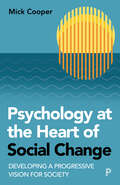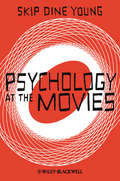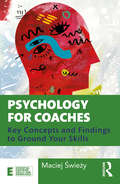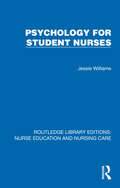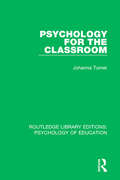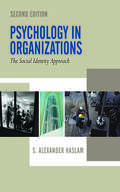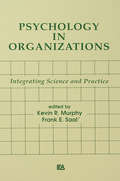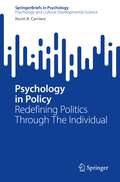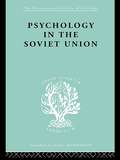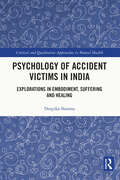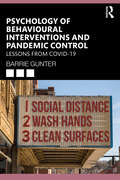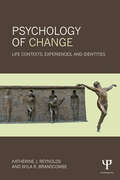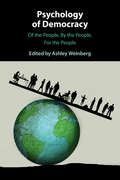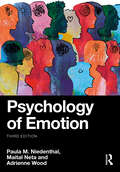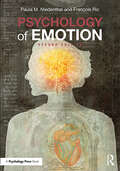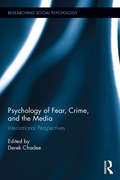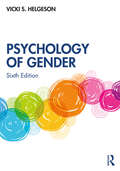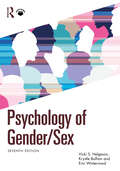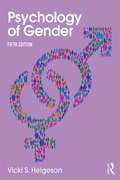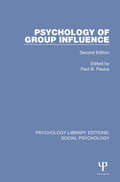- Table View
- List View
Psychology at the Heart of Social Change: Developing a Progressive Vision for Society
by Mick CooperWe live in troubled times: climate crisis, war and authoritarian ‘populism’ are just some of the challenges we are currently facing. Never has there been such a need for a new approach to politics – nor such an opportunity for one. To create a world in which people thrive, we need to know what thriving is. Over the past century, psychotherapy – and its parent discipline, psychology – has built up a vibrant, nuanced and highly practical understanding of human wellbeing and distress. This book describes a progressive political approach that integrates insights from the psychotherapeutic and psychological domain, moving us from a politics of blame to a politics of understanding. In this vision of society – surrounded by a culture of radical acceptance – all individuals can live rich and fulfilling lives. We need those shaping our political landscape to understand psychological needs and processes more deeply to enhance our ability to work with others in a spirit of collaboration, dialogue and respect.
Psychology at the Movies
by Skip Dine YoungPsychology at the Movies explores the insights to be gained by applying various psychological lenses to popular films including cinematic depictions of human behavior, the psychology of filmmakers, and the impact of viewing movies.Uses the widest range of psychological approaches to explore movies, the people who make them, and the people who watch them Written in an accessible style with vivid examples from a diverse group of popular films, such as The Silence of the Lambs, The Wizard of Oz, Star Wars, Taxi Driver, Good Will Hunting, and A Beautiful MindBrings together psychology, film studies, mass communication, and cultural studies to provide an interdisciplinary perspectiveFeatures an extensive bibliography for further exploration of various research fields
Psychology for Coaches: Key Concepts and Findings to Ground Your Skills (Essential Coaching Skills and Knowledge)
by Maciej ŚwieżyPsychology for Coaches offers its readers a chance to ground their interpersonal skills in sound psychological theory and research. It provides a solid synthesis of current concepts and research results, translating them into hands-on recommendations and examples of tools. The book was written in response to questions asked by trainee coaches eager to make sure they are doing their best to provide a safe, professional, and valuable service. It offers clear, practical examples on how to apply presented concepts into coaching practice. It challenges popular strategies that may have unwanted side effects and offers to replace them with specific ideas on how to use coaching conversations to: support goal setting and consistent motivation encourage autonomy and responsibility assist self-reflection and manage learning increase awareness of emotions and manage them better identify and change beliefs and schemas build a healthier perception of oneself Psychology for Coaches will be essential reading for coaches in all areas, including those in training, who want an accessible, fast introduction to the most relevant areas of psychology and an overview that will guide their further learning. It will also be an inspirational guide for people aiming to use coaching skills in other professional roles.
Psychology for Student Nurses (Routledge Library Editions: Nurse Education and Nursing Care)
by Jessie WilliamsOriginally published in 1954 and as a second edition in 1957, this book provides a survey of the main psychological principles necessary to nurses in their work. As well as being a textbook for nurses in training, it was written in such a way as to be of value to qualified nurses as well. The author drew widely on her experience as psychologist in London Teaching Hospitals including Guys, Great Ormond Street and University College Hospital, and as a lecturer to nurses in training. She illustrates her theme with many practical examples drawn from hospital experience. This is a careful and scientific study of psychology applied to nursing which is readable and avoids the use of unnecessary technical terms.
Psychology for the Classroom (Routledge Library Editions: Psychology of Education)
by Johanna TurnerOriginally published in 1977, Psychology for the Classroom is offered as an aid to people who are learning themselves and helping other people to learn: that is, to parents, students and particularly to teachers. The activity of teaching, to be successful, requires the teacher to understand the behaviour of the learner as fully as possible. Some of the insights into human behaviour gained by psychologists may prove helpful to the teacher in complementing his or her experience and intuitive understanding, and it is with this in mind that the topics covered in this book have been selected. Section one deals with cognitive aspects, an understanding of which his essential since cognitive processes are the means by which individuals are able to make sense of their environment. Section two considers the social situation in which knowledge and understanding develop, i.e. the way in which social interaction affects learning. Section three focuses on the individual, stressing that academic achievement depends not only on hard work but is intimately related to an individual’s personal development and personality. The book will be valuable to psychology students, student teachers and teachers on in-service courses, for its coverage of relevant psychological research and the description of pertinent experiments and studies of the time. Its originality lies in the way in which it communicates the importance of teachers using psychology as a basis for forming hypotheses which they can test for themselves – not necessarily as researchers, but in a mood of personal exploration.
Psychology in Brazil: Innovative Approaches From The Psychology Of Social Development
by Silvia Helena KollerThis book presents an overview of the work of the most important Psychology researchers in Brazil, contributing to the internationalization of the discipline and fostering cross-cultural approaches in the field. Over the last two decades, Psychology research has experienced an enormous growth in Brazil, which has placed the country among the ten nations with the highest scientific output in the area. A big part of this output, however, remains inaccessible to the majority of the international community because it’s mainly published in Portuguese. This book intends to overcome this barrier, presenting a highly relevant sample of the best Psychology research produced in Brazil to those who are unable to read in Portuguese. <P><P> In each chapter, a top Brazilian researcher is invited to present a summary of his/her main contributions to the field. The result is a rich overview of the main areas in which Brazilian psychologists have concentrated their work over the last decades, such as Developmental Psychology, Community Psychology, Educational and School Psychology, Evolutionary Psychology, Health Psychology, History of Psychology and Social Psychology. <P><P>By putting together such a wide array of topics, Psychology in Brazil – Scientists Making a Difference offers a rich overview of the research in the country to psychologists, educators and social scientists in general interested in cross-cultural approaches within the Behavioral Sciences.
Psychology in Latin America: Current Status, Challenges and Perspectives
by Rubén ArdilaThis contributed volume is a real “who is who” in Latin American psychology. Edited by the most prominent psychology researcher alive in the region, the book presents a comprehensive panorama of psychology in Latin America as a science, as a profession and as a way of improving the quality of life of individuals and communities. Despite its achievements, Latin American psychology is little known by the international psychological community. In order to fill this gap, Dr. Rubén Ardila has invited the most important researchers and practitioners in the region to present an overview of psychology as both a profession and a research field in Latin America in the following areas:· Scientific research· Professional issues· Clinical and health psychology· Developmental psychology· Educational and school psychology· Organizational and work psychology· Social psychology· Community psychology· Legal and forensic psychology Psychology in Latin America – Current Status, Challenges and Perspectives seeks to place Latin American psychology on the map of international psychology, and by doing so it aims to foster cooperation between researchers, practitioners and students from the region with its peers from all over the world.
Psychology in Oceania and the Caribbean (International and Cultural Psychology)
by Grant J. Rich Neeta A. RamkumarThe Caribbean and Oceania are understudied areas from a psychological perspective, and this book is designed to fill that knowledge gap. In addition to diverse, rich cultural traditions and abundant economic opportunity for some, these regions also reflect the challenges of modernity, including crime, poverty, ethnic tensions, adaptations to climate change, and disparities in health, education, and access to care. With contributions from noted psychologists in the Caribbean and Oceania, as well as experts from around the globe, this book provides nuanced examination of significant psychological issues in nations such as Fiji, Guyana, Belize, Haiti, Jamaica, and more. Psychologists, psychiatrists, and other mental health professionals with an interest in this part of the world, will find this volume a rich resource, as will those generally interested in the relationship between culture and psychology. This book takes you on an outstanding journey of what is occurring in cultural psychology in the 21st century. It addresses the abundance of each nation through a transformational lens of current practices in psychology in Oceania and the Caribbean. I would absolutely recommend it to anyone interested in sailing the high seas connecting the present with the endless possibilities of those who dare to journey into the waters of a divine future.”- Florence Denmark, Past-President, American Psychological Association "Chock full of expert knowledge and insights, Psychology in Oceania and the Caribbean is an indispensable resource for psychologists. A must-read that will expand your understanding of life in these regions and beyond! “- Pamela A. Hays, PhD, Author of Addressing Cultural Complexities in Practice "This is a breath-taking book in its coverage of the uniquely endowed psychology worlds of Oceania and the Caribbean. Now that Dr. Rich, Dr. Ramkumar, and colleagues have produced this awesome book volume on the cultural psychology of the rim water nations, I have a palpable sense of relief from their having addressed a huge gap in cultural psychology scholarship. This volume opens hitherto undreamed of opportunities for further studies on cultural practices in psychology in Oceania and the Caribbean!”- Elias Mpofu, PhD, DE.D, CRC, MAPS, Professor of Health Sciences at the University of North Texas, Honorary Professor of Health Sciences at the University of Sydney and Executive Board member of the Australian Psychological Society’s Rehabilitation Psychology Interest Group"This book represents a vital exploration into the purpose and practice of Psychology in island nations. It is a welcome compilation of academic writings from sociocultural perspectives within Oceania and the Caribbean and serves as a landmark account of the unique forces shaping the development and evolution of Psychology in these states." - Gerard Hutchinson MD, Professor of Psychiatry, University of the West Indies, St Augustine, Trinidad and Tobago
Psychology in Organizations
by S. Alexander HaslamAlex Haslam has thoroughly revised and updated his ground-breaking original text with this new edition. While still retaining the highly readable and engaging style of the best-selling first edition, he presents extensive reviews and critiques of major topics in organizational psychology - including leadership, motivation, communication, decision making, negotiation, power, productivity and collective action - but with much more besides. Key features of this 2nd Edition: · An entirely new chapter on organizational stress which deals with highly topical issues of stress appraisal, social support, coping and burnout. · New, wider textbook format and design making the entire book much more accessible for students. · Wide range of pedagogical features included - suggestions for further reading included at the end of each chapter; comprehensive glossaries of social identity, social psychological and organizational terms.
Psychology in Organizations: integrating Science and Practice (Applied Psychology Series)
by Kevin R. Murphy Frank E. SaalThis book deals with two key questions. First, is there a firm scientific basis for the major applications of psychology in organizations? Second, does the practice of psychology in organizations contribute in any meaningful way to psychological research? This text attempts to answer these questions by describing some of the unique ways in which Industrial/Organizational (I/O) psychologists integrate science and practice in applying psychology in organizations. The editors of this volume believe that there is great potential for the effective interplay of science and practice in I/O psychology. Aware, however, that much work must still be done before a truly effective integration can be achieved and maintained, they have created a text that offers specific suggestions for improvement as well as many examples of successful integration. Psychology in Organizations explores the unique relationship between science and practice within industrial/organizational psychology. The contributors seek to answer two main questions: * Is there a firm scientific basis for the major applications of psychology in organizations? * Does the practice of psychology in organizations contribute in any meaningful way to psychological research? After an initial examination of the industrial/organizational psychologist as a scientist and practitioner, Psychology in Organizations looks at specific roles played in such issues as job performance and productivity, sexual harassment, drug abuse, and drug testing. A final chapter looks at both the past and future of the field and suggests future applications.
Psychology in Policy: Redefining Politics Through The Individual (SpringerBriefs in Psychology)
by Kevin R. CarriereThis book takes an insider perspective of the psychological issues of creating policy. Instead of considering what the products of policy are - often the case in psychological and political science work - this book examines the individual processes present in proposing and engaging with policy. The individual who engages with the policy and its meanings, the individual who resists the policy through conformity, and the individual who writes the policy for their own ideological purposes are all political actors in a psychological system. This book puts forward a cultural political psychology as the psychological study of the process of values, policy, and power dynamics. Through exploring public policy through private policy generation and individual interaction, this book pushes theoretical understandings of policy and activism in new ways. Centering on an individual’s own values in facing various policy restrictions from governments, parents, or peers, the importance of examining collective actions and also collective inactions of individuals is noted and expanded on in the text. The book provides applications of its arguments through examining the processes of unionization and actualized democracy. It seeks to point out new research avenues, including the hypogeneralization of values, one’s exclusion through activism, and everyday revolutions. This book addresses the centrality of the individual and meaning-making systems when considering where policy, politics, and psychology intersect. This book is primarily addressed to psychologists and political scientists interested in how to make change in public policy. While the experiences within the book are United States-centric, the thoughts and theories behind them are meant to be applicable to a wide variety of political systems. As there is currently very little literature on the topic, this book seeks to fill the gap and offer concise information on such an important dimension of cultural and political psychology. It is expected that the book will be of great interest for researchers in these areas, as well as for graduate-level students. In particular, this book will be relevant to researchers and students working on political psychology, public policy, development, community psychology, social representations, semiotics, activism, and social movements, to name a few.
Psychology in the Soviet Union Ils 272 (International Library of Sociology)
by Brian SimonThis is a collection of papers created from a visit by teachers and educationalists to the U.S.S.R in April 1955 by invitation of Academy of Educational Sciences of the R.S.F.S.R. The aim of this volume is to familiarize English readers with the general direction of Soviet psychology, but designed to be of interest to teachers as well as psychologists.
Psychology of Abuse
by Juan Moises de la SernaIn this eBook, we will approach one of the most important themes of our time, abuse, both physical and psychological, from a new perspective. This eBook will help us know a reality that is scarcely talked about beyond the circles of health and safety specialists, and that is extended all through life. Abuse in all its forms will affect every individual in different ways, despite the efforts made by some authorities to stop social inequalities, such as gender violence.
Psychology of Accident Victims in India: Explorations in Embodiment, Suffering and Healing (Critical and Qualitative Approaches to Mental Health Experiences among Vulnerable Groups)
by Deepika SharmaThis book traces the psychological journey of accident survivors with locomotor disability, as they move from processes of suffering to healing. It provides a holistic understanding of disability by looking into the embodied understanding of the body as shaped by the socio-political and cultural discourses around impairment. The book addresses the lack of critical qualitative research on the health and well-being of Persons with Disabilities (PWDs) by developing a nuanced understanding of their experiences. It showcases the challenges PWDs face and the process of recovery and regaining agency through interviews and personal narratives. It also highlights the steps we need to take to better understand and address the everyday needs of PWDs and make our society more inclusive. An important addition to the research on disability studies in the Global South, this book will be useful to researchers and students interested in the areas such as disability studies, critical health psychology, mental health of vulnerable populations, and qualitative research as well as professionals working in the area of health and rehabilitation. People engaged in policymaking related to disability services, rehabilitation and rights will also find this book helpful.
Psychology of Behavioural Interventions and Pandemic Control: Lessons from COVID-19 (Lessons from the COVID-19 Pandemic)
by Barrie GunterPsychology of Behavioural Interventions and Pandemic Control is a unique text that examines the COVID-19 pandemic in relation to population risk factors and the efficacy of non-pharmaceutical interventions deployed by many governments around the world to bring the pandemic under control. The book presents critical and insightful lessons that can be drawn up to assess governments’ performance in relation to the pandemic and to guide the construction of effective measures to put in place in readiness for any future public health crises on this scale. It starts by examining lessons learned from historical pandemics and then turns to early epidemiological modelling that influenced the decision of many governments to implement wide-ranging interventions designed to bring public behaviour under close control. It also examines the findings of research that tried to understand pre-existing population risks factors which had some mediating influences over COVID-19, mortality rates, and the effects of interventions. Early modelling work is critiqued, and the discussion also identifies weaknesses in early modelling research. The author, Barrie Gunter, goes on to consider ways in which multiple disciplines can be triangulated to produce more comprehensive models of risk. He also offers suggestions on how future pandemic-related research might be constructed to deliver more powerful analyses of the effects of interventions and the role played by different population risk factors. This insight might then deliver better policies for pandemic control and for safe release from that control. This is essential reading for students and researchers in psychology, public health and medical sciences. It would also be of interest to policy makers assessing government strategies, responses and performance.
Psychology of Change: Life Contexts, Experiences, and Identities
by Nyla R. Branscombe Katherine J. ReynoldsChoice Recommended Read This volume tackles the critical question of whether people change or whether they remain relatively constant across the lifespan. Much existing literature in psychology has largely endorsed the concept of stability. Indeed, in many people’s minds, the person is understood to be set in stone, as a function of early socialization and reaching a particular stage of development, evolutionary processes, or traits that are hard-wired from the beginning by genes and biology. However, in recent years, important scientific developments in theory and research concerning the psychology of change have emerged. In contrast to the commonly held conception of the individual as fixed, this research illustrates how malleable people are—showing much behavioral plasticity. The chapters in this volume, written by scholars at the cutting-edge of research into the psychology of change, showcase these developments with the aim of advancing knowledge of the field and encouraging further research. Topics addressed include brain function, cognitive performance, personality, psychological well-being, collective action to achieve social change, responses to life stressors, and political change. The message is clear—the culture we live in, what happens to us along the way, and who we think we are and want to be, can all change people.
Psychology of Democracy: Of the People, By the People, For the People
by Ashley WeinbergDemocracy was forged in the furnaces of oppression, whether combatting tyranny or affirming the rights of the individual. As democracy is under threat in many parts of the world, there has never been a more urgent need to understand political thoughts and behaviours. This lucid and accessible book brings together a global group of scholars from psychology, political science, communication, sociology, education and psychiatry. The book's structure, based on Abraham Lincoln's well-known phrase 'Of, by and for' the people, scrutinises the psychological factors experienced by politicians as representatives 'of' the electorate, the political institutions and systems devised 'by' those we elect, and the societies that influence the context 'for' us as citizens. From trust to risk, from political values to moral and religious priorities, from the personality and language of leaders to fake news and anti-democratic forces, this book provides vital new insights for researchers, politicians and citizens alike.
Psychology of Emotion
by Paula M. Niedenthal Adrienne Wood Maital NetaPsychology of Emotion reviews both theory and methods in emotion science, exploring findings about the brain; the function, expression, and regulation of emotion; similarities and differences due to gender and culture; the relationship between emotion and cognition; and emotion processes in groups. With a focus on emotion in the typically developing individual, the text's main themes include conscious and unconscious processes; the ways in which emotions arise in, and are constrained by, social situations and social processes; the regulation and sharing of emotion and their effects on mental health; and the manner in which culture (including subculture) shapes or moderates some of these processes. A defining assumption of the book, distinguishing it from much of its competition, is that both biology and social situation are important forces in the experience of emotion.Key features of the third edition include: Emphasis on cutting-edge research and insights from contemporary affective science Developmental Details sections, offering in-depth exploration of chapter themes within crucial stages of the human lifespan Key concepts highlighted with bolded vocabulary and integrated Learning Links, providing clear, illustrative connections to each chapter's core topics Comprehensive in its scope yet eminently readable, Psychology of Emotion serves as an ideal introduction for undergraduate students to the scientific study of emotion.
Psychology of Emotion: 2nd Edition
by Paula M. Niedenthal François RicSince the turn of the twenty-first century, the psychology of emotion has grown to become its own field of study. Because the study of emotion draws inspiration from areas of science outside of psychology, including neuroscience, psychiatry, biology, genetics, computer science, zoology, and behavioral economics, the field is now often called emotion science or affective science. A subfield of affective science is affective neuroscience, the study of the emotional brain. This revised second edition of Psychology of Emotion reviews both theory and methods in emotion science, discussing findings about the brain; the function, expression, and regulation of emotion; similarities and differences due to gender and culture; the relationship between emotion and cognition; and emotion processes in groups. Comprehensive in its scope yet eminently readable, Psychology of Emotion serves as an ideal introduction for undergraduate students to the scientific study of emotion. It features effective learning devices such as bolded key terms, developmental details boxes, learning links, tables, graphs, and illustrations. In addition, a robust companion website offers instructor resources.
Psychology of Fear, Crime and the Media: International Perspectives (Researching Social Psychology)
by Derek ChadeeThe media continue to have a significant persuasive influence on the public perception of crime, even when the information presented is not reflective of the crime rate or actual crime itself. There have been numerous theoretical studies on fear of crime in the media, but few have considered this from a social psychological perspective. As new media outlets emerge and public dependence on them increases, the need for such awareness has never been greater. This volume lays the foundation for understanding fear of crime from a social psychological perspective in a way that has not yet been systematically presented to the academic world. This volume brings together an international team of experts and scholars to assess the role of fear and the media in everyday life. Chapters take a multidisciplinary approach to psychology, sociology and criminology and explore such topics as dual process theory, construal level theory, public fascination with gangs, and other contemporary issues.
Psychology of Gender
by Vicki S. HelgesonNoted for its fair and equal coverage of men and women, Psychology of Gender reviews the research and issues surrounding gender from multiple perspectives, including psychology, sociology, anthropology, and public health. Going far beyond discussions of biological sex and gender identity, the text explores the roles that society has assigned to females and males and the other variables that co-occur with sex, such as status and gender-related traits. The implications of social roles, status, and gender-related traits for relationships and health are also examined. The text begins with a discussion of the nature of gender and development of gender roles, before reviewing communication and interaction styles and how they impact our friendships and romantic relationships. It concludes with an exploration of how gender influences both physical and mental health. New to the 6th Edition: Emphasis on the intersectionality of gender, considering it as a part of wider social categories such as race, ethnicity, social class, and gender identity Recognition of the increasingly prevalent view that gender is nonbinary Extended coverage of LGBTQ individuals, their relationships, and their health Expanded discussions of key issues including gender-role strain, gender fluidity, women and STEM, parenthood, balancing family and work demands, online communication, and sexual harassment Accompanied by a comprehensive companion website featuring resources for students and instructors, alongside extensive student learning features throughout the book, Psychology of Gender is an essential read for all students of gender from psychology, women’s studies, gender studies, sociology, and anthropology.
Psychology of Gender/Sex
by Vicki S. Helgeson Krystle M. Balhan Erin WinterrowdNow in its 7th edition, Psychology of Gender/Sex reviews the research and issues surrounding gender from multiple perspectives, including psychology, sociology, anthropology, and public health. It explores the ways in which gendered experiences are varied across development, social identities, and locations, focusing on the construct of gender/sex, as well as the implications of gender/sex for school, work, relationships, and health.Going far beyond discussions of biological sex and gender identity, the text explores the gender/sex roles that society assigns to people, the various ways in which people break and bend those roles, and the other variables that co-occur with gender/sex, such as status and power.Key features of this edition include: Updated and integrated coverage of LGBTQ+ issues, identities, and experiences Expanded emphasis on the intersectionality of gender/sex Renewed focus on abortion/bodily autonomy and reproduction Expanded discussions of emerging topics such as online interactions and social media, the impact of COVID on gender/sex inequalities, gender/sex in the workplace, and social justice and activism Engaging and readable, Psychology of Gender/Sex is an essential text for all students of gender from psychology, women’s studies, gender studies, sociology, and anthropology.
Psychology of Gender: Fifth Edition
by Vicki S. HelgesonNoted for its fair and equal coverage of men and women, this book reviews the research and issues surrounding gender from multiple perspectives including psychology, sociology, anthropology, and public health, with an emphasis on the interaction between biological and social theories. The implications of social roles, status, and gender-related traits on relationships and health that are central to students' daily lives are emphasized throughout. Students learn how to distinguish the similarities and differences between the sexes and the theories that explain the differences. Methodological flaws that may impact the observance of sex differences are also examined. Learning activities and pedagogical tools included in the text: Do Gender exercises which provide an opportunity to test hypotheses and explore data Sidebars on special interest topics and numerous visuals?that bring the studies to life Take Home Points that summarize key concepts in bulleted format Boldfaced key terms and definitions, chapter summaries, discussion questions, and suggested readings which help students review the material New to the 5th Edition: Expanded sections on cohabitation, homosexuality, online relationships, social media influences, single-sex classrooms, sex differences in math abilities, and gender implications of divorce on health Expanded coverage of gender and parenting, gender and the workplace, gender and power, and balancing work and family An expanded intersectional approach that highlights how gender is connected to social class, race, and ethnicity, including more coverage of gender system justification theory Coverage of transgender issues including recent changes in the DSM guidelines Streamlined discussions to further engage students to think about gender issues A companion website at www.routledge.com/cw/Helgeson where instructors will find Power Point slides, multiple choice quizzes, and short answer questions with suggested answers for each chapter; and students will find flashcards of key terms, chapter outlines, and links to related websites and further reading Divided into three parts, each section builds on the previous one. First, gender and the development of gender roles across cultures are introduced. Scientific methods used to study gender, attitudes toward gender, and the latest data and theories on sex differences in cognitive, social, and emotional domains are then introduced. Theories of gender-role development, including evolutionary, social learning, social role, and gender schema theories are reviewed along with the implications of gender on achievement. Part one reviews the key information on the similarities and differences between the sexes and the theories that explain the differences which lay the foundation for the remainder of the book. Part two examines the role of gender in relationships including communication styles and the impact of these interactions on friendship and romantic relationships. The third part examines the role of gender on physical and mental health. The effects of marriage and parenting on health are reviewed, including domestic abuse, along with how gender affects the association between work and health. This is an ideal text for upper level gender-focused courses including the psychology of gender, psychology of women or men, gender issues, and gender, women’s, or men’s studies taught in psychology, women’s studies, gender studies, sociology, and anthropology.
Psychology of Group Influence: Second Edition (Psychology Library Editions: Social Psychology)
by Paul B. PaulusOriginally published in 1989, this title showcased new developments, providing a systematic and in-depth overview of some of the basic issues in the field of group psychology. Subject areas range from basic group processes to complex interactive phenomena. There are international contributions, with chapters covering the latest developments in the field at the time. The volume provided students and professionals with a comprehensive, coherent, and interrelated picture of the broad scope of group influence processes. The volume was motivated by the belief that group psychology is a central and important activity for social psychology.
Psychology of Group and Collective Intelligence
by Yoshiko ArimaThis book integrates the findings of group research emphasizing “Madness of the Crowd” versus collective intelligence that highlights “Wisdom of the Crowd.” Thus it provides an overview of psychological research on group processes and collective intelligence, analyzing cognitive, social, and structural factors. Chapters address applications of this research to contexts such as organizations and online behavior, and offer guidelines and hands-on demonstrations of psychological principles. The book is highly relevant to students and instructors in personality and social psychology.
